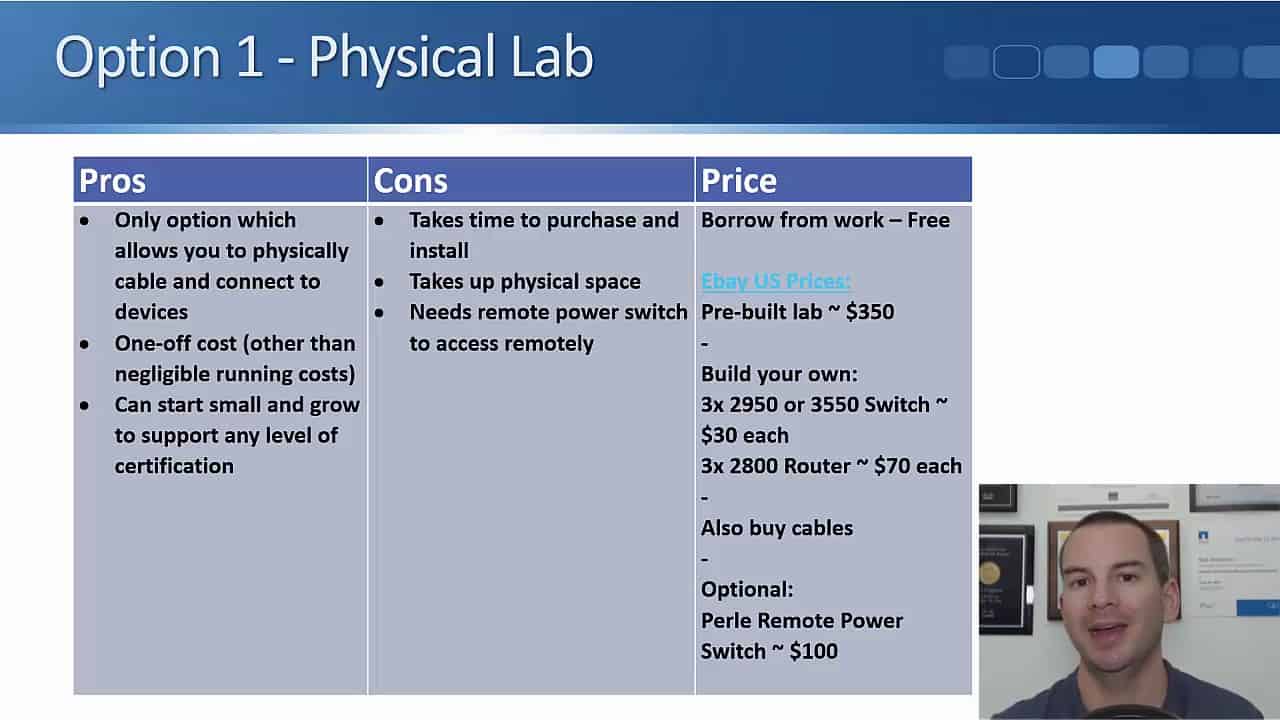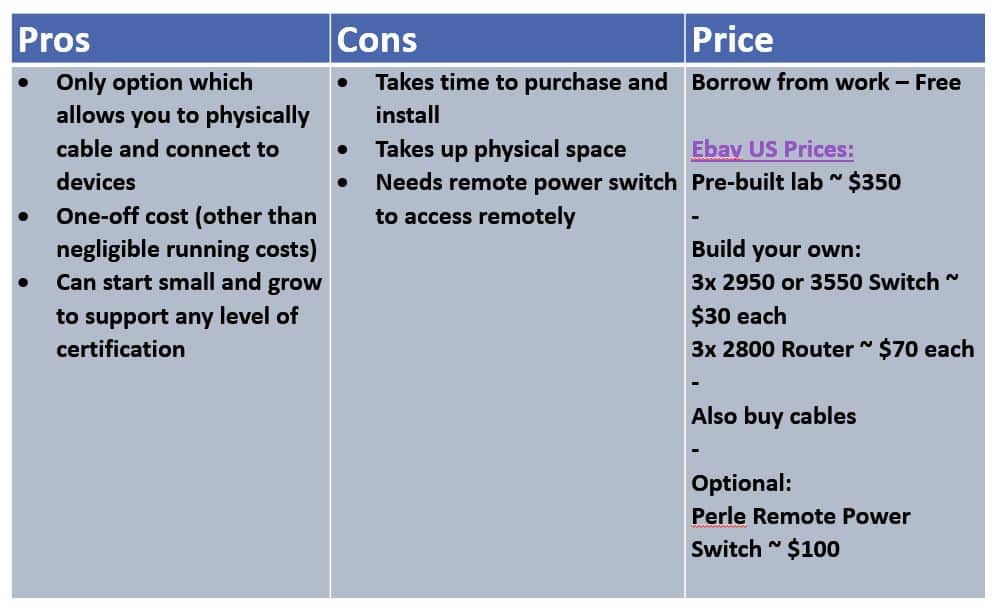
This post is part of my ‘Cisco CCNA Lab Options’ course. Click here to enrol in the complete course for free!
In this Cisco CCNA training tutorial, I will explain the different options you can use for a Cisco CCNA lab and the advantages and disadvantages of each. You can read part two about online lab rentals here. Scroll down for the video and also text tutorial about using a physical lab.
CCNA Lab Option 1 – Physical Lab

Tanyar Pooyeh

Your schedule and your great training kept me motivated. The best point was that I could just send the configs and tell you which part I cannot understand, and you were there! Making it understandable, for which I am really thankful.
I took the exam right after I finished your training and passed! And was promoted to Professional Administrator.
When you’re ready for your first CCNA lab I recommend that you build your own physical lab with physical Cisco routers and switches. The big benefit you get from this is that it’s the only lab option where you’ll be able to physically touch the equipment.
Later on when you've got more experience in networking, you’ll realise that around 99% of the time you don't actually need to touch the equipment you’re working on. For example, you’re in New York but working on a router or a switch that’s in Boston. You just need to open up Putty on your desktop to connect to it remotely.
However, I recommend that you have physical access to the devices when working with Cisco routers and switches for the first time, as this will build your confidence in networking.
You can pass your CCNA exam at the first attempt by taking my Cisco CCNA Complete course in conjunction with the AlphaPrep test engine.
When you receive a new device from the factory, you will need to connect a console cable to the console port to do the initial configuration. By having an actual physical lab, you will get a feel of how to cable the different devices. You will have a visual understanding of how they connect and communicate with each other.

Physical CCNA Lab Advantages
Another benefit that you get from having a physical lab is it’s a one-off cost. You pay for the equipment one time and then you own it forever. With the other lab options (apart from the free ones), they all have a recurring cost, in which you have to pay either hourly, monthly or yearly, depending on the option you are using. It can get really frustrating if you get stuck on a problem when you’re using an online lab provider because it will rack up the hourly fee. This is not an issue if you have a physical lab setup. You can spend as long as you need to figure out a feature and it will not cost you any extra.
You can start with just a small setup depending on your current needs and expand it as needed. A few routers and switches will suffice for your CCNA studies and you can purchase additional equipment when you move on to the CCNP or another technology track. As you progress your certifications, you don’t need to build a new lab from scratch.
Physical CCNA Lab Disadvantages
There are also a few disadvantages. First off, buying equipment takes time. Unless you’ve got money to burn, you will probably be purchasing your equipment either from eBay or from another online store. So you will have to spend time searching online for good deals. Then you will have to wait for the equipment to get shipped to you and then unbox it and physically put it together.
Secondly, space can be an issue as you need to set this up somewhere. If you are in relationship, this can be an issue. I know that my wife is not going to want me to have a Cisco lab lying around in the living room and if that's the only place I've got to put it, that's a problem.
Lastly, the other lab options can be easily accessed from anywhere. Having a physical lab typically means you have to be physically with it to use it. There is a workaround for this however. You can install a remote power switch and then connect to that over the Internet to power on your devices. To get to the command line on the routers and switches you’ll also want a Cisco terminal server. It adds a little bit of extra complexity with building the lab though and adds to the cost. You can normally pick up an old Perle power switch for around $100 and a Cisco 2511 terminal server for around $150 on eBay, if you're based in the US.
Borrow It!
Okay, so that's all the pros and cons. Let's see how much this is going to actually cost. The cheapest way that you can build a physical lab is by borrowing equipment from work. This is very often possible - you don’t need to be working in the IT department or part of the networking team. If you're working for a medium to large-sized company, it’s highly probable that they have spare equipment. Especially if the company has been around for long, there’s a good chance that they have old routers and switches that have been sitting on their shelves for years. Just approach anyone from your networking team and say, "hey, I want to study for my CCNA, do you have any spare routers or switches?" There’s a high possibility that they're going to be able to help you out.
What You Need and How Much It’s Going to Cost
If this option isn’t available to you then you’ll have to buy the lab yourself. eBay is likely to be the cheapest option if it’s available in your location, otherwise you’ll have to search around for refurbished equipment from network brokers which will be more expensive.
You can either buy a pre-built CCNA lab or you can buy the components one by one and build it yourself.
You can save a bit of money if you buy it separately, though it is more convenient to buy it as package. A pre-built lab costs around $350 in the US. If you're building your own, I'd recommend 2950s or 3550s for the switches, and 2800s for the routers (preferably with a serial port installed although you can buy this separately for a little bit of additional cost). I'd recommend that you get at least three routers and three switches to be able to practice all of the different features.
When you’re studying for the CCNA track you don’t need powerful equipment. I wouldn’t get anything too old though because you do want to have some scalability in your lab to support your future studies as well. You can find the 2950 and 3550 switches for around thirty dollars each including postage in the US, and $70 for the 2800 routers. Don’t forget to buy cables too.
If you’re going to go with a packaged pre-built lab then be very careful when choosing. There's no standard list of equipment in these labs. A ‘CCNA Lab’ from two different sellers can have very different hardware included. That’s why there’s different price points, but different sellers will offer different value for money. Do your research before browsing, know what equipment suits you and check what you're actually getting.
Somebody might advertise something as a CCNA lab which only contains a single router and a switch. That's really not going to cut it. There's different models of routers and switches as well so be careful and check what you're actually getting.
Where to find additional information
To get more information about how to go about building your physical lab, the equipment to buy and how to cable everything together, Google is your friend. There's loads of information on the internet so go to Google.com and search for ‘CCNA Physical lab’. A word of warning here, check the date that the article was written. What was right for the lab five years ago is not going to be what's right for the lab today, so check that you're using a recent article.
Okay, that's about everything on building a physical lab. I'll see you back in the next post in this series where I’ll talk about online labs.
You can learn about network automation on Roger Perkin's blog.
I-Medita have a couple of great question and answer resources for Cisco interview and CCNA exam practice:
http://www.imedita.com/networking-online-quiz/
http://imedita.com/blog/ccna-interview-questions-bank/